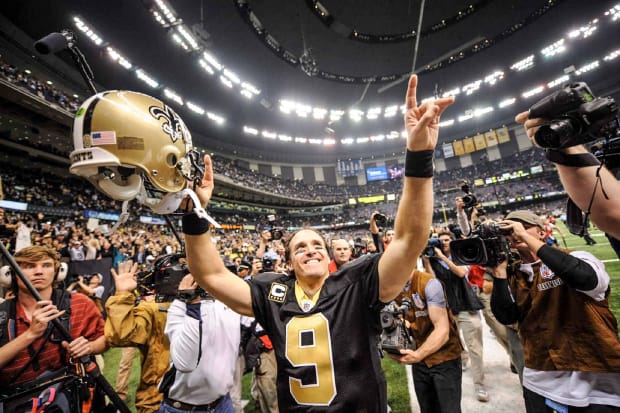Competing in an era of all-time great quarterback play, he separated himself not just with his historic stats.
Drew Brees’s transcendent pro football career will be defined by numbers, so many numbers, because the digits he collected are too staggering to ignore: 80,358 passing yards, 571 touchdown throws, 67.7% completion rate, 20 seasons spent dissecting NFL defenses as the premier surgical QB, not just of an era but of all time. He’ll be tagged, too, for winning only one Super Bowl, as if historically great quarterbacks can just snap fingers and collect rings.
I’ll remember Brees, though, not just for the records he collected with an assassin’s ruthlessness, but also for how damn grounded he was in the most abnormal of ecosystems, the alternate universe of NFL stardom. When I interviewed him in Louisiana for
a 2018 Sports Illustrated cover story, he invited me to his son’s bouncy-house birthday party after and even packed a plate of food to go. Funny enough, the pizza, pasta and salad were neatly separated in the container he provided. Brees remained precise and meticulous, always, from the most meaningful interactions to a totally meaningless one.
Those who know Brees best understand this side of him. “He’s probably the most normal of all the superstars I’ve come across,” says Tom House, the respected throwing coach who has trained Brees, Tom Brady and Nolan Ryan, among many, many others in various sports. So many elite athletes, House says, put their careers first. He’s not judging; they have to in order to maximize their earnings and potential. Brees, though, struck House as closer to 50–50 in how he split his priorities between his team and his family. Each pursuit made Brees better for the other.
House, a former major league pitcher, knew the other way from experience, as baseball had cost him his first marriage. Now remarried, the throwing guru who helped stabilize the motion of the most accurate passer in NFL history, learned an important lesson about balancing his life in return, marking yet another measure of Brees’s outsize impact, which extended to the injured athletes inspired by his 2006 comeback from shoulder surgery to fellow NFL players who appreciated his work as a member of their union’s executive committee.
Like every fan who ever tugged on a Saints jersey, House wishes that Brees had won another title. He came so close in the last four seasons, leading teams with legitimate hopes only to be knocked out on a fluky catch now known as the Minneapolis Miracle (2017), a terrible pass interference call (’18), an odd overtime upset (’19) and, most recently, a GOAT named Brady (January). But House asks, fairly: Why define Brees by the games he didn’t win when we have so many examples of his brilliance?
Sure, there were missteps. Brees endorsed AdvoCare, a health and wellness company that in 2019 paid $150 million to settle charges of operating a pyramid scheme. Then there was the Yahoo! Finance interview this past offseason in which he advocated that players stand for the national anthem rather than kneel in protest. But there Brees should be commended for listening to teammates outraged over what he said, for trying to understand the issues that led to the protests and committing to work toward improvements.
Brees made 13 Pro Bowls, won the 2004 Comeback Player of the Year award and won 172 games as a starting quarterback. He led the NFL in passing yards seven times and fashioned more than 50 game-winning drives. He would win that Super Bowl after the ’09 season and nab the game’s MVP honors, too.
His impact, though, stretched far beyond wins and those statistics, eye-straining as they were. Brees will also be lauded for what he did in, to and for New Orleans, starting with his arrival in 2006, fresh off the surgery to repair the torn right labrum that threatened to end what to that point was an uneven career. He took a city still reeling from Hurricane Katrina and gave back an important and unqualifiable commodity in short supply: hope.
“There’s something almost miraculous about that relationship,” says James Carville, the famous political consultant and lifelong Saints fan. “Drew defines the psyche of a place more than any athlete I can recall. It’s more than wins and losses. It’s borderline supernatural, the way it fits.”

As the seasons flew by, Brees became a vital part of Carville’s life, almost like a friend. The two men never actually met, but Carville began defending Brees in public and private conversations, arguing, fairly, that Brees belonged with Brady and Joe Montana in the best-ever NFL quarterback conversation. “If you don’t count touchdowns, yards and completions, then he’s not,” Carville quips. When the Rams knocked the Saints from the playoffs three seasons ago, after that phantom P-INT, Carville says he felt most “for Brees,” knowing that his odds to secure another title dwindled with each passing year.
Carville also notes, correctly, that how Brees is considered, his ultimate standing in NFL history, will “age well over time.” We’ll view Brees more favorably in 10 years, Carville posits. The missteps will fade, the numbers will remain and the chance that anybody approaches them—beyond, maybe, Patrick Mahomes under fairly ideal circumstances—is as likely as Brees’s growing another six inches in retirement.
House agrees. He says that when football analysts look back at the quarterback era that’s now close to ending, Brees and Brady will stand alone. “All the pundits are saying [Aaron] Rodgers is this and [Peyton] Manning is that,” House says. “But Drew is right there with the GOAT. Time will bear that out.”
Brees will also transition into broadcasting, where he’s likely to excel, as a “normal” legend who can break down football with uncanny precision. In other words, he’ll continue to be Drew Brees, the superstar quarterback who never carried himself that way.





0 Comments